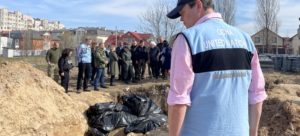The country’s Indigenous peoples and environmental movement are mobilizing to hold the government to account
August 1, 2024 | Kevin Koenig | Eye on the Amazon
August 20 will mark a year since Ecuadorians headed to the polls and voted to keep over 700 million barrels of crude oil permanently in the ground in Yasuní National Park. The country’s Constitutional Court gave the government and state-run Petroecuador just one year to end oil activities, close all wells and roads, dismantle existing infrastructure, and remediate and restore the area. While it was always considered daunting to complete this process within that time frame, they are nowhere close to meeting the deadline, putting the region’s isolated Indigenous peoples and the country’s democracy at great peril.
The 2023 vote was heralded as the first time that any county chose to leave significant oil reserves in the ground and retire producing wells by popular referendum, with over 60% voting in favor.
Known as the Ishpingo, Tiputini, and Tambococha (ITT) oil fields, they are located inside Yasuní National Park, a UNESCO World Biosphere Reserve that is widely considered to be the most biodiverse place on the planet. Its unique position along the equator also allows it an outstanding level of biodiversity, containing more than 120 reptile species, 596 species of birds, 200 mammal species, and nearly 500 species of fish. One single hectare of Yasuní forest contains at least 100,000 insect species.
It is also the ancestral territory of the Waorani Indigenous people and the Tagaeri and Taromenane, two clans living in voluntary isolation. Continued drilling here is an existential threat to these peoples, and it raises the risk of biodiversity loss and climate instability as forests are felled in pursuit of fossil fuel extraction incompatible with the Paris climate agreement to keep warming from reaching 1.5 degrees Celsius.
The popular referendum was a hard-won victory that sent a clear signal on where the world needs to go and posed a challenge to wealthier nations: if a net oil exporter like Ecuador that relies on oil revenues for a significant percentage of its GDP could keep its largest reserve in the ground to protect the climate, biodiversity, and Indigenous rights, then why couldn’t countries in the global north like the U.S., Canada, or Norway?
But the precedent-setting nature of the vote is in jeopardy if the government refuses to implement it, and it raises doubts about direct participatory democracy if the expressed will of voters isn’t respected. Both the government of President Daniel Noboa and Petroecuador have sought to delay implementation and subvert the plebiscite’s requirements, dragging their feet at every turn and using the country’s security crisis as a convenient excuse to keep the oil flowing.
To date, the only concrete action by the Noboa administration was an executive decree on May 8 – some nine months after the vote – establishing the formation of a committee that will oversee the implementation of the referendum and decommissioning of the oil concession. The committee is only composed of representatives from government agencies, and it does not include the participation of the Waorani or other local communities, nor any plan or timeline by which the process would proceed or be completed – something the actor Mark Ruffalo brought to President Noboa’s attention in a high-profile social media battle.
But in a mix of ill will and incompetence, Petroecuador petitioned the court to extend the time period to close the oil fields, but filed it several days past the deadline. The court quickly denied the petition and reiterated that the company was bound by the original decision, which ordered that “all activity related to the extraction of oil in the ITT be removed in a progressive and orderly manner, in a term no greater than one year from the notification of official [election] results.”
The Indigenous movement and civil society always understood that the most challenging part of protecting Yasuní would come after the vote, compelling the government to implement the mandate of its citizens and shut down drilling, and they are mobilizing to hold it to account.
The Waorani people have declared a state of emergency in their territory and are mobilized to hold Noboa and Petroecuador to account. The Waorani Nation of Ecuador (NAWE) along with the national Indigenous organization CONAIE are organizing major events in Quito on August 20 to mark the anniversary of the referendum and expose the government’s failure to comply with its deadline. NAWE is also convening a multi-day summit on Yasuní in the Ecuadorian Amazon at the end of the month to build collective strategies and power to ensure the Waorani and local communities have a seat at the table in the process to decommission drilling.
The hard work has just begun, so please stand with Ecuador’s Indigenous movement and civil society to protect the climate, Indigenous rights, and biodiversity in Yasuní and ensure that the historic vote to keep fossil fuels permanently in the ground truly is a precedent-setting victory that can be replicated around the world!




